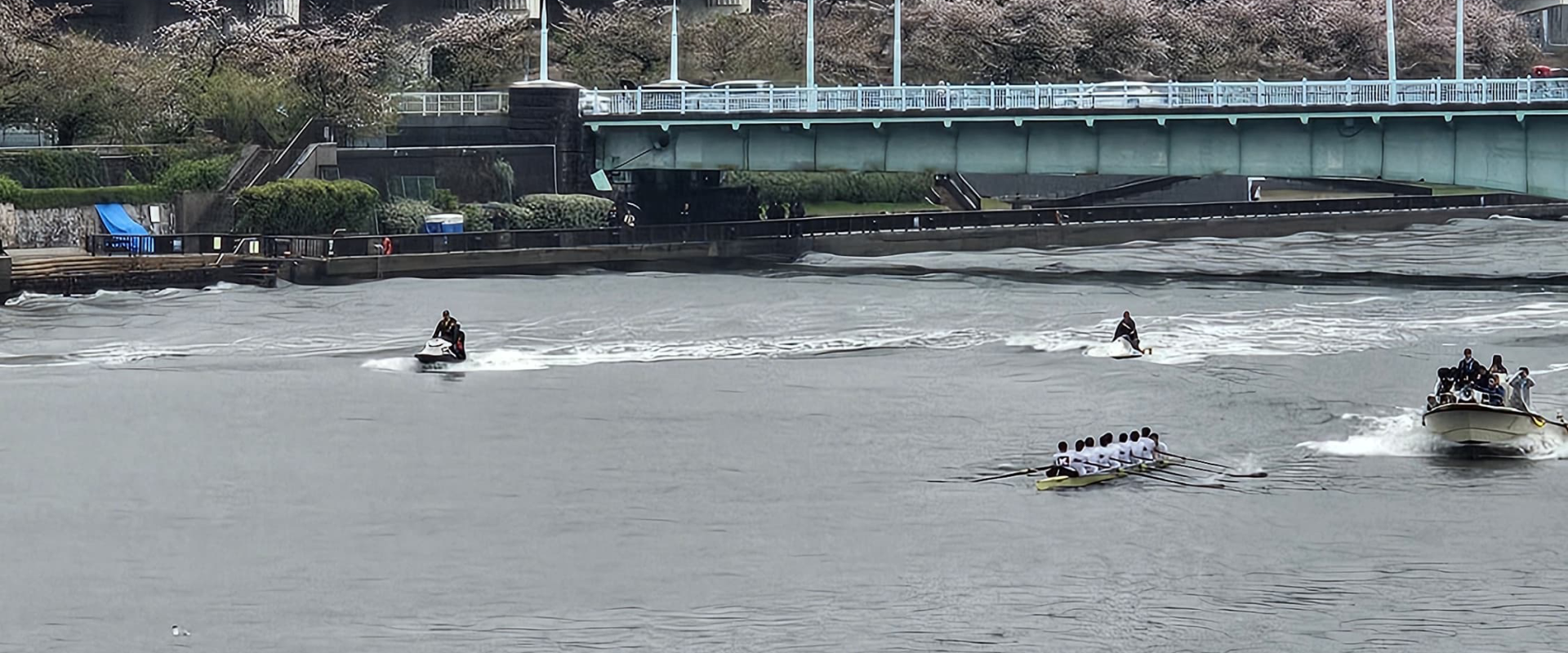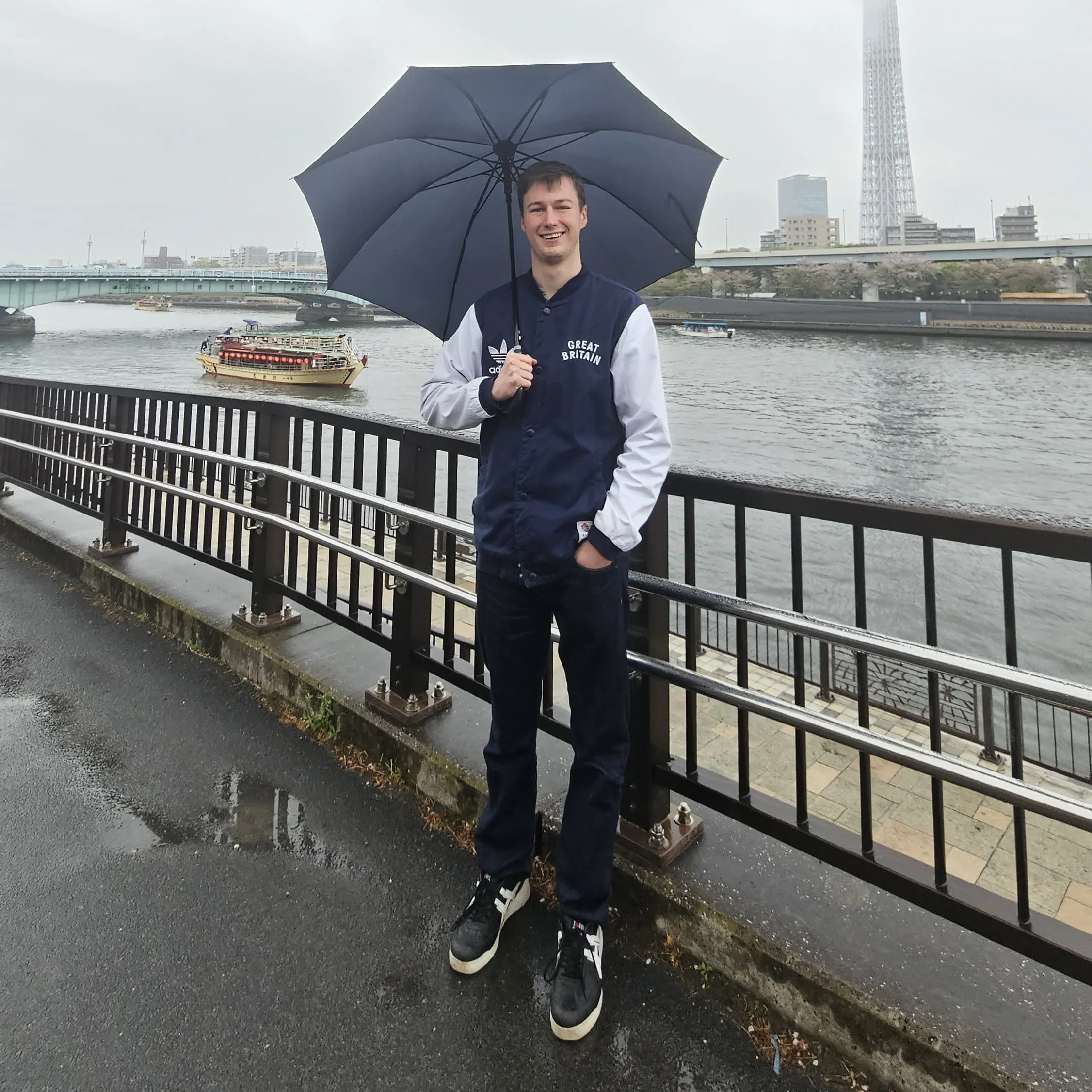
Run in Japan: Race on the river
14 Apr 2025
Last month we were sad to wave goodbye to Charlie Benny, as he started a new chapter living in Tokyo. Luckily for us - it presented an exciting opportunity for Run Communications to open it's first international office, with Charlie exploring opportunities for the business across Japan and further afield.
Another exciting possibility was the chance to pick Charlie's brains about his new home, and the way the sports landscape differs to the UK and Europe...
"Braving substantial but not uncharacteristic rain in the capital, this weekend I attended a historic boat race between two great universities, whose prestige is aptly matched by their fierce will to win.
I am of course, referring to Tokyo’s Waseda-Keio Regatta, an over a century old battle held each spring on the Sumida river. By coincidence, dates aligned perfectly this year with another university boat race some six-thousand miles away on April 13th – Cambridge retaining their bragging rights for both women’s and men’s races on a murky Thames.
Curious differences between the two events are perhaps reflective of shifts in sporting culture over recent years. The stories, drama and surrounding controversy have long given sport competitions the ‘colour’ that transforms them to entertainment. A well-documented eligibility dispute saw three from Cambridge ruled as unable to participate – not that the matter is closed, as Blackstone Chambers mooted “there are strong grounds to challenge the lawfulness of the decisions”.
In stark contrast, there was sportsmanship aplenty amongst the two Japanese competitors. The president of Waseda University offered pre-race “heartfelt prayers for the continued success of Keio University and its Rowing Club”. Chairman of Mita (Keio University’s) Rowing Club requested spectators to “please give your support to both the winning and losing crews”.
I could feel this deep-rooted respect as a spectator. Cheer squads from both schools were in fine voice, steadfast in place through abysmal weather at Sakurabashi Bridge for each race finale – another key difference, this Regatta has no fewer than eleven races across a packed programme including junior high school and alumni match-ups.
Armed with umbrella I joined the excitable crowd, admiring the unwaning enthusiasm of band players, cheerleaders, and impassioned orchestrators. Run is no stranger to the unfiltered passion of sport and physical activity – incredible volunteers, and those who give their time to make great events happen are, and always will be, the most important players in helping communities get active.

To see such remarkable commitment on the riverside was a timely reminder of how much sport means to people across the globe. For many, this is a quintessential experience of sport; braving desperate weather to be a supportive parent on a Saturday morning, travelling cross-country to questionable destinations to follow your favourite team, or getting out for that stress-relieving jog at substantial risk of losing feeling in your toes. We make it a priority, it matters to us. Because what else would give us such a rush, connect us to others, and ease our everyday stresses?
The spectacle itself reached fever-pitch from my view on Sakurabashi Bridge as the crews approached in the misty distance. I’d opted to pick an arbitrary team to align with, in all honesty based on the school band that impressed me most, which was Waseda. My choice proved providential, as the Waseda crew emerged with a healthy lead of their Keio counterparts and retained their crown from the year prior.
Even with the surface disturbed by rain, the Sumida river is a majestic setting befitting of the occasion. The boat race has not always been hosted here – moved post-war owing to river pollution, and then returning from 1978 after significant efforts were made to improve air quality and purify the water. The same course of action has not yet displaced Oxford vs Cambridge, but warning signs are there.
Fulham Reach Boat Club provided data indicating E coli levels on the Thames race course range from 350 units to over 6,500 units, which is considered unsafe. Last summer, we were lucky enough to work with the Fulham club to host one of a number of Run’s media events during Paris 2024, celebrating the incredible difference National Lottery funding has made to grassroots sports clubs across the UK. Thanks to this continued backing and belief that sport makes an amazing positive difference to people’s lives, important research like this will also inform the step-change we need to make, if sport as we know it is to go on amongst environmental degradation.
One of the brilliant opportunities presented by Run’s new international presence is further developing our understanding of how sport and physical activities are enjoyed across different communities. The Regatta, helpfully coinciding with the UK’s own iconic Boat Race, reflected some of the biggest current topics of sport; competition’s place among sporting integrity, environment, sustainability. Yet crucially, it was quick to remind us what matters most – the unfiltered joy sport brings, even if we have to occasionally brave the pouring rain to enjoy it."
